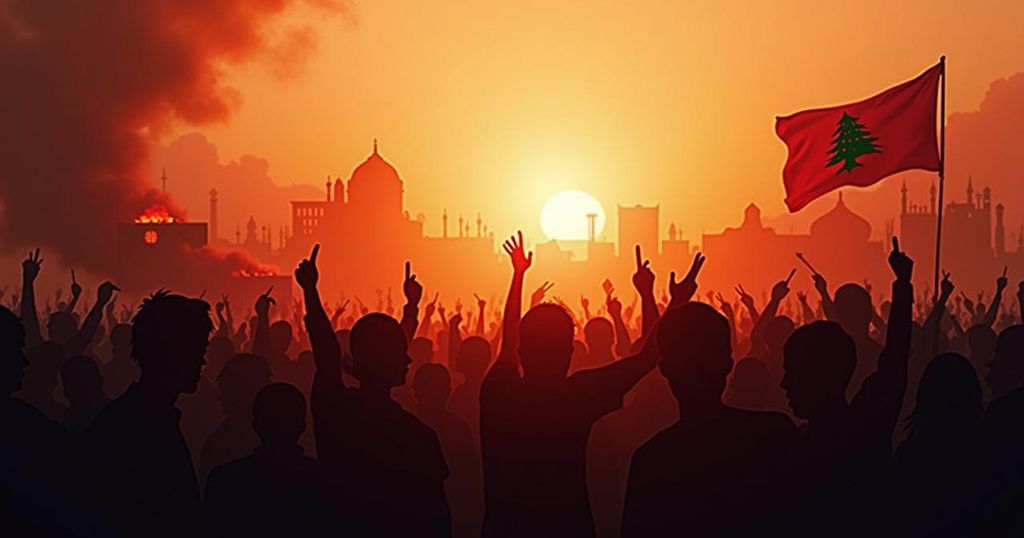Tens of thousands protested in Iran and Yemen against Israeli attacks on Lebanon and Gaza. Responding to a call from Iranian authorities, demonstrators expressed solidarity with Hezbollah and condemned Israeli actions. The protests included significant gatherings in several cities, with people carrying flags and chanting against Israel. In Bahrain, limited protests occurred despite governmental restrictions. Recent escalations in the conflict have resulted in high civilian casualties and increased regional tensions.
Tens of thousands of individuals took to the streets in Iranian cities as well as in the rebel-controlled Yemeni capital on Friday to express their opposition to Israeli military actions in Lebanon and Gaza. This mass mobilization was prompted by a call from Iranian authorities earlier in the week, encouraging supporters to rally in favor of Hezbollah and to denounce what they termed the “barbaric crimes” of the Israeli regime in Palestine, as reported by the official IRNA news agency. Hezbollah, aligned with Iran, is a central component of the “axis of resistance,” which also includes armed factions throughout the Middle East that have aimed their efforts at Israel, particularly in solidarity with Hamas in the ongoing conflict. Enhanced hostility in the region has seen Yemeni Huthi rebels coordinating a significant demonstration in Sanaa, occurring just after they launched a missile targeting Israel. In Tehran, protests erupted following Friday prayers at Enghelab Square, where participants waved flags of Hezbollah and Palestine, while carrying portraits of Hezbollah leader Hassan Nasrallah. The atmosphere was charged, with chants of “Israel is destroyed. Lebanon is victorious,” echoing across the square. Furthermore, protesters engaged in the symbolic act of burning flags of both Israel and the United States. State-run television networks captured similar gatherings in various Iranian cities, including Semnan, Qom, Kashan, Kermanshah, Shiraz, and Bandar Abbas. Meanwhile, in Sanaa, a significant turnout of Huthi supporters brandished rifles and placards, vocally expressing their solidarity. One demonstrator, Mortada al-Mutawkil, affirmed, “We say to our brothers in Lebanon that you will be victorious, God willing. This war is not the first nor the last with the Israeli enemy, but God willing it will be more painful for Israel than the 2006 war.” Another voice, Mohammed Mushki, articulated the sentiments shared by many: “No matter how long the war lasts and no matter how big it is, we are on their side, all the Yemeni people, on the side of the Lebanese and Palestinian people until victory, God willing.” Additionally, in Bahrain—an ally of Israel where public demonstrations are tightly controlled—hundreds rallied in two separate protests to condemn the ongoing violence in Gaza and the bombardment of Lebanon. Participants chanted for an end to relations with Israel, with messages of solidarity toward Gaza and Lebanon, exemplified by their call: “The people demand an end to normalisation.” The context of these protests stems from the rapid escalation of hostilities initiated by Hamas’s attack on Israel on October 7, which has led to an intense conflict and retaliatory actions predominantly from Hezbollah. Recent Israeli airstrikes have caused extensive casualties, marking it as one of the most lethal periods since Lebanon’s civil war. Amid increasing tensions, analysts observe that Iran is attempting to support Hezbollah strategically while avoiding full-scale involvement that could compromise its own position in the regional conflict.
Recent conflicts between Israel and militant groups in Lebanon and Gaza have intensified, marked by significant violence and casualties. Hezbollah, a crucial ally of Iran, has been involved in retaliatory actions against Israel following a series of attacks that have resulted in widespread devastation in Lebanon. The deteriorating security situation has led to substantial protests across the region, particularly within Iran and Yemen, as various factions align against Israel in solidarity with Palestinian groups. The international implications and responses to these demonstrations highlight the ongoing tensions in the Middle East and the delicate balance that Iran seeks to maintain amid escalating hostilities.
The protests in Iran and Yemen reflect the deep-seated tensions surrounding the Israeli-Palestinian conflict, particularly with Lebanon’s Hezbollah as a focal point of resistance. The large turnout signals widespread public sentiment against Israeli actions, while the involvement of regional actors such as the Huthi rebels indicates a collective stance among Iran-aligned groups. As violence continues, the situation remains precarious, with Iran cautiously supporting Hezbollah in a bid to avoid further escalation that could lead to a broader war.
Original Source: www.france24.com






